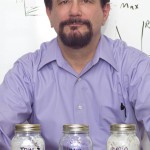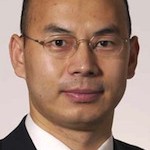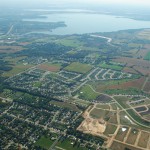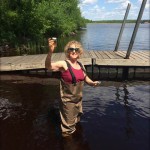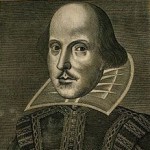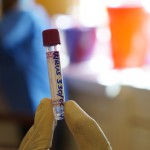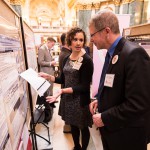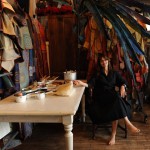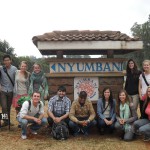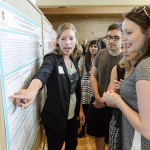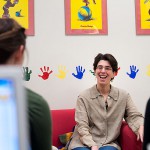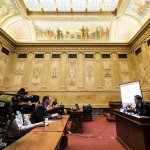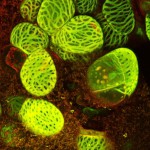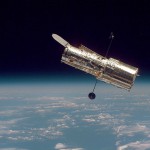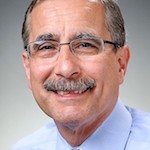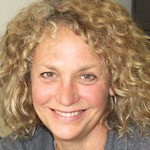Business will implement new phosphorus recycling process in Midwest
A University of Wisconsin–Madison startup is helping Midwest cities remove pollutants from wastewater through a new process that will benefit local farmers, too.
Compact UV lasers could identify substances from a distance
For soldiers in the field, the ability to identify an object or substance based on how it responds to light could mean the difference between life and death. They could, for example, determine from a safe distance if an approaching person or vehicle is carrying an explosive device or dangerous biological agent.
Changes in land use, climate and agriculture undermine efforts to clean up Madison lakes
Efforts to clean up the Madison lakes are being hampered by more asphalt, row crops and intense rainstorms and higher manure concentrations on the landscape, according to a new study from the Water Sustainability and Climate project at the University of Wisconsin–Madison.
Two UW–Madison alumni honored as inspirational leaders by Heinz Awards
When a 7.0 magnitude earthquake rocked Haiti in January 2010, former Marine and 2005 UW–Madison graduate Jacob Wood, along with fellow veteran William McNulty, assembled a rapid-response team to provide aid. Their success gave rise to Team Rubicon, an organization of volunteer veterans armed with a new mission: providing swift and effective disaster relief.
UW-Madison offering Shakespeare MOOC
On April 26, on the heels of William Shakespeare’s birthday, the University of Wisconsin–Madison will launch its third free Massive Open Online Course (MOOC) of 2015, “Shakespeare in Community,” to an audience of more than 12,700 enrolled participants.
In Sierra Leone, a chance to learn from Ebola
When Yoshihiro Kawaoka and members of his research team first arrived in Sierra Leone in December 2014, the consistent wail of ambulance sirens was a frightening reminder that the Ebola virus was there, too.
Community arts procession STRUT! scheduled for Saturday, May 2
Members of the public are invited to watch and participate with over 30 of Madison's creative and cultural groups in STRUT!, a community arts procession showcasing stilt walking, dance, music, design, puppetry and more.
Suspending Kenya travel a difficult move
For the first time since 2007, Susan Gold, a nurse clinician at the University of Wisconsin Hospital and Clinics, won’t be heading to Kenya this year to help teens learn to live with HIV/AIDS. The 10 students who would have traveled with her in the Global Health Field Experience are making other plans in the wake of the UW–Madison decision to suspend all student travel to the country.
UW-Madison expert on infant learning elected to American Academy
Jenny Saffran, a University of Wisconsin–Madison professor of psychology and an expert on how infants learn, is among leaders in academia, business, public affairs and the arts elected to membership in the American Academy of Arts and Sciences, it was announced today (April 22, 2015).
Recent sightings: Kawaoka at the Capitol
University of Wisconsin–Madison virologist Yoshihiro Kawaoka speaks to legislators, legislative staff and others about his lab’s work to develop a whole virus vaccine…
Annual study shows Wisconsin poverty rose in fragile economic recovery
Researchers studying the economic and policy forces that affect Wisconsin poverty have released their latest results, which show that although the state economy is creating jobs, the poverty rate rose from 10.2 to 10.9 percent in 2013 using the researchers' expanded measure.
Wisconsin contributions helped Hubble Space Telescope soar
It was “the flea on the tail of the dog.” Roughly 30 years ago, that was how University of Wisconsin–Madison astronomy Professor Robert C. Bless described the High Speed Photometer (HSP), a detector then under development at UW–Madison for the soon-to-be-launched Hubble Space Telescope.
WARF grants to showcase innovation
As part of its 90th anniversary celebration, the Wisconsin Alumni Research Foundation (WARF) is funding up to five projects that best fete UW–Madison’s legacy of innovation.
Messing named director of Waisman Center
Albee Messing, a University of Wisconsin–Madison professor of comparative biosciences and an international leader in research on Alexander disease, has been named director of the Waisman Center, UW–Madison School of Medicine and Public Health Dean Robert Golden announced April 14.
UW launches new performance management policy and program
As part of the new HR Design structure (and as described in the HR Design Strategic Plan), the Office of Human Resources (OHR) is rolling out a new performance management policy and best practices program. Implementation will begin in July 2015, and full compliance is expected across campus by July 2016.
Deep national history of immigration predicts wide cultural comfort displaying emotion
People who live in countries built on centuries of migration from a wide range of other countries are more emotionally expressive than people in more insular cultures, according to research led by University of Wisconsin–Madison psychology Professor Paula Niedenthal.

